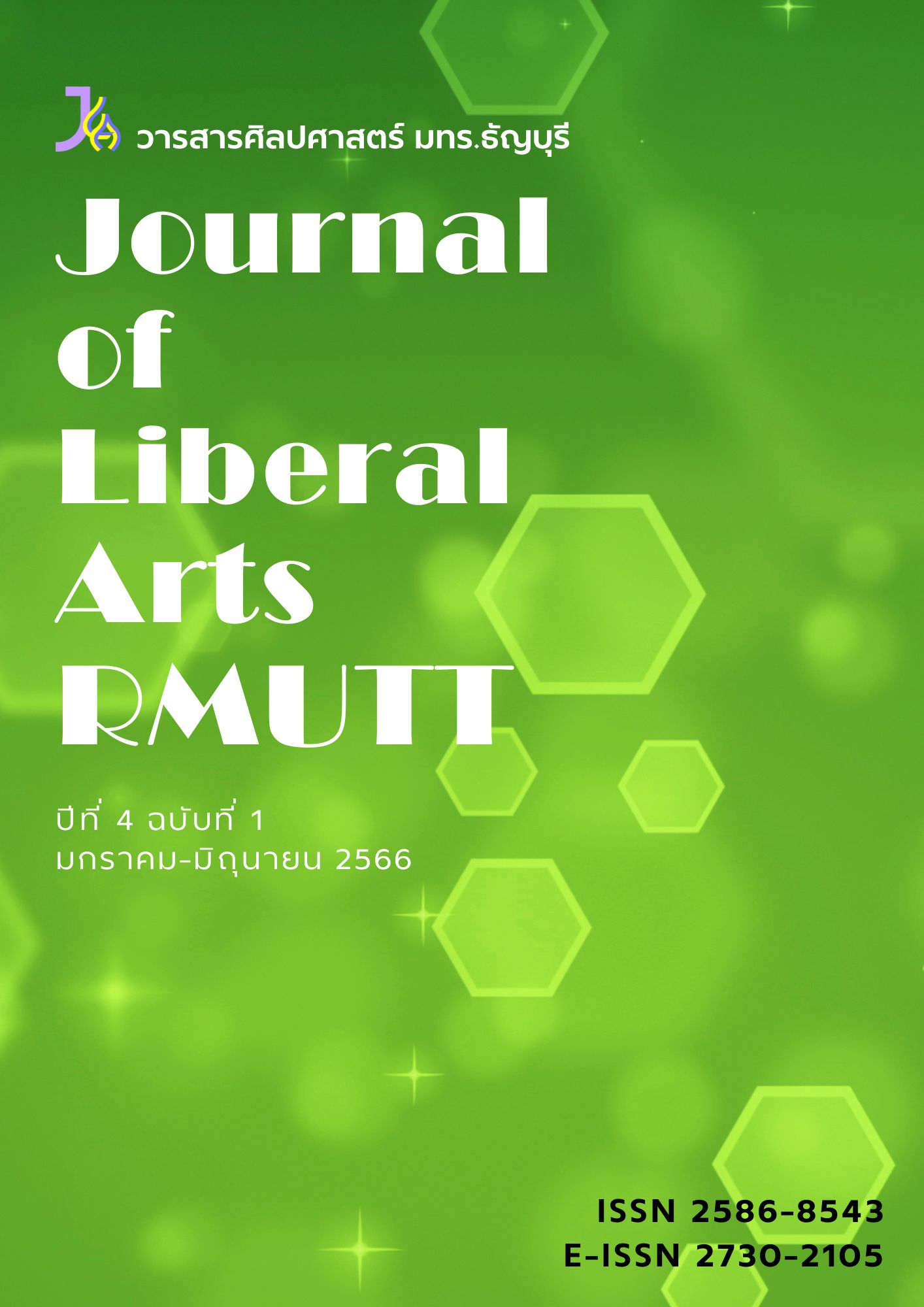บทบาทของสื่อดิจิทัลต่อการเคลื่อนไหวทางการเมืองของเยาวชนไทย
คำสำคัญ:
การสื่อสาร , สื่อดิจิทัล , การรวมตัว , การเคลื่อนไหวทางการเมือง , การเคลื่อนไหวของเยาวชนไทยบทคัดย่อ
บทความนี้เป็นการศึกษาบทบาทของสื่อดิจิทัลต่อการเคลื่อนไหวทางการเมืองของเยาวชนไทย โดยเน้นประเด็นสำคัญ 3 ประการ ได้แก่ การรวมตัว การสื่อสาร และการเคลื่อนไหวทางการเมือง การเริ่มต้นของยุคดิจิทัลได้เปลี่ยนภูมิทัศน์ของกิจกรรมทางการเมืองและสังคมทั่วโลกอย่างเห็นได้ชัด และการเคลื่อนไหวของเยาวชนในประเทศไทยก็ถือว่าเป็นกรณีศึกษาที่น่าสนใจเกี่ยวกับพลวัตที่กำลังก่อตัวขึ้นเหล่านี้ บทความนี้จึงมีวัตถุประสงค์เพื่อรวบรวมความรู้ที่ได้จากการศึกษาแบบสหวิทยาการต่าง ๆ เพื่อทำความเข้าใจว่าแพลตฟอร์มสื่อดิจิทัลสร้างนิยามใหม่ให้กับวิธีการที่เยาวชนไทยเข้ามามีส่วนร่วมในกิจกรรมทางการเมืองอย่างไร ตลอดจนวิเคราะห์ว่าสื่อดิจิทัลช่วยในการระดมพลอย่างมีประสิทธิภาพได้อย่างไร จนทำให้สามารถระดมผู้ประท้วงได้อย่างกว้างขวางและรวดเร็วกว่าวิธีการแบบดั้งเดิม ในแง่ของการสื่อสาร พบว่า สื่อดิจิทัลเหล่านี้ไม่เพียงแต่เพิ่มการเข้าถึงและความรวดเร็วของการเผยแพร่ข้อมูลข่าวสารเท่านั้น แต่ยังรวมถึงวิธีการสร้างวาทกรรมของการเคลื่อนไหวประท้วงด้วย นอกจากนี้ การถือกำเนิดของสื่อดิจิทัลก่อให้เกิดรูปแบบใหม่ของการเคลื่อนไหวในพื้นที่ออนไลน์ ขยายขอบเขตออกไปนอกขอบเขตทางภูมิศาสตร์ และเปิดช่องทางสำหรับการประท้วงในรูปแบบที่สร้างสรรค์และแตกต่างจากแบบดั้งเดิม อย่างไรก็ตาม จากการศึกษาวรรณกรรมที่ผ่านมาทำให้เกิดคำถามที่สำคัญเกี่ยวกับข้อจำกัดที่อาจเกิดขึ้น ความเสี่ยง และผลกระทบระยะยาวของการพึ่งพาสื่อดิจิทัล ดังนั้น จึงควรมีการวิจัยเชิงประจักษ์ที่เหมาะสมยิ่งขึ้นเพื่อให้เข้าใจพลวัตเหล่านี้แบบองค์รวมภายใต้บริบททางสังคมและการเมืองที่ซับซ้อนของประเทศไทย ข้อค้นพบในบทความนี้ไม่เพียงแต่มีความสำคัญต่อการทำความเข้าใจความซับซ้อนของขบวนการเยาวชนไทยเท่านั้น แต่ยังนำไปสู่การอภิปรายทางวิชาการที่กว้างขึ้นเกี่ยวกับการเคลื่อนไหวทางสื่อดิจิทัลในศตวรรษที่ 21
เอกสารอ้างอิง
Allcott, H., & Gentzkow, M. (2017). Social media and fake news in the 2016 election. Journal of Economic Perspectives, 31(2), 211-36.
Bennett, W. L., & Segerberg, A. (2012). The logic of connective action. Information, Communication & Society, 15(5), 739-768.
Bosch, T. E. (2020). Social media and everyday life in South Africa. London: Routledge.
Carr, N. (2011). The shallows: What the internet is doing to our brains. New York: W.W. Norton & Company.
Castells, M. (2012). Networks of outrage and hope: Social movements in the internet age. Cambridge: Polity Press.
Chong, M. (2018). The Routledge companion to media and activism. London: Routledge.
Del Vicario, M., Bessi, A., Zollo, F., Petroni, F., Scala, A., Caldarelli, G., ... & Quattrociocchi, W. (2016). The spreading of misinformation online. Proceedings of the National Academy of Sciences, 113(3), 554-559.
Flaxman, S., Goel, S., & Rao, J. M. (2016). Filter bubbles, echo chambers, and online news consumption. Public Opinion Quarterly, 80(S1), 298-320.
Fuchs, C. (2018). Social media: A critical introduction. London: Sage.
Howard, P. N., & Hussain, M. M. (2011). The role of digital media. Journal of Democracy, 22(3), 35-48.
Howard, P. N., & Hussain, M. M. (2013). Democracy's fourth wave?: Digital media and the Arab Spring. Oxford: Oxford University Press.
Human Rights Watch (2023). Stifling the Internet: Government control and repression in Thailand. Retrieved June 26, 2023, from https://www.hrw.org/world-report/2023/country-chapters/thailand
Kahne, J., & Bowyer, B. (2018). The political significance of social media activity and social networks. Political communication, 35(3), 470-493.
Jones, L. (2020). Explaining the Thai protest movement. Canberra: Australian Strategic Policy Institute.
Lee, A. Y., & Ting, K. W. (2015). Media and information praxis of young activists in the Umbrella Movement. Chinese Journal of Communication, 8(4), 376-392.
Lynch, M. (2012). The Arab uprising: The unfinished revolutions of the New Middle East. New York: Public Affairs.
Morozov, E. (2011). The net delusion: The dark side of internet freedom. New York: Public Affairs.
Primack, B. A., Shensa, A., Sidani, J. E., Whaite, E. O., Lin, L., Rosen, D., ... & Quesnel, V. (2017). Social media use and perceived social isolation among young adults in the US. American Journal of Preventive Medicine, 53(1), 1-8.
Rattanakorn, P., & Thaweesit, S. (2020). Thailand’s youth protests and the digital information war: Emerging ‘smart mobs’? Media and Communication, 8(2), 425-435.
Samuel, A. (2004). Hacktivism and the future of political participation. Unpublished doctoral dissertation, Harvard University.
Sombatpoonsiri, J. (2017). Online disinhibition and the unleashing of Thai trolling culture. Journal of Psychosocial Research on Cyberspace, 11(1), 56-72.
Suksamran, N. (2022). Social media and the formation of collective identity in the Thai youth movement. Journal of Social Media Studies, 5(2), 35-47.
Taweesin, T. (2023). Streaming dissent: Live streams and the Thai youth movement. International Journal of Communication, 17(2023), 1530-1550.
Thai PBS World (2020). Understanding Thailand’s evolving hard-line stance on dissent. Retrieved June 26, 2023, from https://www.thaipbsworld.com/
Tomasello, F. (2023). From industrial to digital citizenship: rethinking social rights in cyberspace. Theory and Society, 52, 463–486.
Tufekci, Z. (2017). Twitter and tear gas: The power and fragility of networked protest. New Haven, CT: Yale University Press.
Turkle, S. (2011). Alone Together: Why we expect more from technology and less from each other. New York: Basic Books.
Tuwaphalangkun, N. (2018). Social movements in the digital era: A case study of opposition to the draft of the Criminal Immunity Royal Decree and resistance to the Single Gateway system. Journal of Journalism, 11(1), 93-116.
Wang, Z., Liu, J., & Zhang, X. (2023). Digital divide and mobilization in social movement: An analysis of Thai youth movement. International Journal of Sociology and Social Policy, 43, 36-61.
Wong, S. (2021). Mobilizing the #MilkTeaAlliance: social media and the Thai youth movement. Journal of Asian Studies, 80(3), 611 – 629.
Zuboff, S. (2019). The age of surveillance capitalism: The fight for a human future at the new frontier of power. London: Profile Books.
ดาวน์โหลด
เผยแพร่แล้ว
รูปแบบการอ้างอิง
ฉบับ
ประเภทบทความ
สัญญาอนุญาต
ลิขสิทธิ์ (c) 2023 วารสารศิลปศาสตร์ มทร.ธัญบุรี

อนุญาตภายใต้เงื่อนไข Creative Commons Attribution-NonCommercial-NoDerivatives 4.0 International License.









